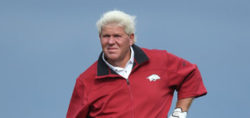Ken Green Reveals Horrible Secret From Childhood

Ken Green is definitely not your cookie-cutter PGA Tour pro. He’s definitely in the old-school category of blunt honesty, funny and doesn’t bow the golf’s almighty.
But what you’ll read in this excellent Golf Digest excerpt from his new book Hunter of Hope: A Life Lived Inside, Outside and On the Ropes, is how he battled and overcame a whole host of catastrophic challenges–including a devastating one he’s harbored since childhood.
Green won five times on the PGA Tour, played on the 1989 Ryder Cup team and won several important tournaments worldwide. Part of the Green lore is how, in desperate need of money in the early 1980s, he bet on—and won—23 of 24 NBA games, using the windfall from his bookie to finance his way to the PGA Tour. Green slammed PGA Tour policy, flipped and buried clubs, swore, snuck friends into the Masters in the trunk of his courtesy car, hit balls through the sliding-glass doors of hotel rooms, played legendary money games for high stakes during practice rounds, and generally carried on in a way that delighted fans but kept administrators and even fellow pros on edge. Green was fined in the neighborhood of two dozen times and was mostly unapologetic. He had an unusual countenance, a mostly impassive face set behind large-frame, nerdy glasses. He dressed loudly, his trademark green shoes and glove providing a window to an engaging, fan-friendly personality.
People who got to know Green—even fellow players were wary about doing that—invariably liked him. During the 1990s and beyond, setbacks began to befall Green—injuries, a marriage breakup and prolonged custody battle, clinical depression, financial difficulties, and fighting off an alligator in his back yard. These were only a warm-up for the disasters that were to come at him. His older brother, Billy; girlfriend, Jeanne; and beloved dog, Nip, died in an RV accident in 2009 that resulted in the amputation of Green’s right leg below the knee (see “I Can’t Believe I’m Alive,” Golf Digest, October 2009). Six months later, his 21-year-old son, Hunter, died of a drug and alcohol overdose in his dorm room at Southern Methodist University.
It all came to an end on a particularly violent night when I was 13. It involved one of the two most wretched men (my dad) Louie had brought in. This man and my dad had an all-time drunkfest, and it ended, as usual, with my dad passed out.
My plan has been simple: Use the adversity as my purpose and reason to live. Don’t let life’s tragedies win. But I will always have issues. When will I lose that demon of guilt that goes off in my head every time I talk about this story? Before, I’d thought I’d been some loser for not opening my mouth earlier. I get the sentiment: It’s not your fault; you did nothing wrong. But I promise you, most victims feel like idiots. When I decided to write my book of the good, bad and ugly, the #MeToo movement had not yet come to life. The stories about other awful souls were not in the news yet. I’m thinking those stories and others have played a role in my decision to reveal how ugly these things can get.
I finished by thinking there isn’t much I should be be complaining about today.






